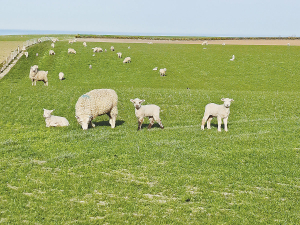Early drought fears ease in Hawke’s Bay, but caution remains
Fears of a serious early drought in Hawke’s Bay have been allayed – for the moment at least.
 Expected dry weather along the east coast of both islands builds a strong case for weaning at least a proportion of the lamb crop early.
Expected dry weather along the east coast of both islands builds a strong case for weaning at least a proportion of the lamb crop early.
A predicted dry summer, thanks to El Nino weather patterns, may make weaning a proportion of the lamb crop a good option this season.
The prospect of hot, dry weather along the east coast of both islands builds a strong case for weaning at least a proportion of the lamb crop early. This will allow high-quality feed to be partitioned into lambs while ewes recover body condition. It also provides the opportunity to sell cull ewes early.
Trials run at Massey University found lambs over 20kg LW coped best with early weaning (minimum weaning weight was 16kg LW). However, it was the quality of the forages on offer that was the greatest determinant of how well lambs grew post-weaning.
Professor Paul Kenyon, who led the early-weaning trials, says early weaned lambs should be given unrestricted access to legumebased forages such as a herb clover mix at a minimum cover of seven centimetres in height.
If lambs are weaned onto the crop, they should be given time to adjust to a change in feed. Running the ewe and lambs onto the crop a few days before weaning, then running the lambs back onto the crop after weaning will help minimise the weaning check.
He says in late lactation all lambs, but especially multiples, are receiving very little nutrition from the ewe, so when grass-growth is limited the ewes are competing with their lambs for feed, compromising the performance of both.
Early weaning can also be particularly useful in hoggets as it will give them more time to recover body condition between lambing and mating again as a two-tooth.
Partitioning high quality feed into lambs in the late spring early summer period will benefit the whole farm system. It means more lambs can be sold prime before the height of summermaking more feed available for capital stock – and ewe lambs can be grown out to heavier weights early. This means there is flexibility to hold them back later when feed resources are more limited.
Mating wrapped up last month at the across-breed Beef Progeny Test on Pāmu’s Kepler Farm in Manapouri.
Libby Judson is a keeper of memories from an age gone by. Tim Fulton tells her story.
A New Zealand-first native tree study has highlighted the Bioeconomy Science Institute's position as a forestry research leader.
Hemp fibre processor Rubisco is relocating its core processing facility to Ashburton as part of a $20-$30 million expansion to leverage what it says is an accelerating global demand for sustainable and renewable fibres.
Tradition meets some of the latest in technology at the 2026 East Coast Farming Expo.
OPINION: Trade Minister Todd McClay and the trade negotiator in government have presented Kiwis with an amazing gift for 2026 - a long awaited and critical free trade deal with India.

OPINION: If the hand-wringing, cravat and bow-tie wearing commentariat of a left-leaning persuasion had any influence on global markets, we'd…
OPINION: With Winston Peters playing politics with the PM's Indian FTA, all eyes will be on Labour who have the…